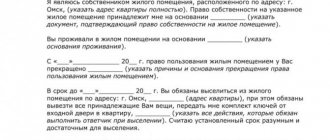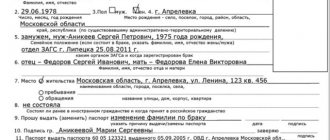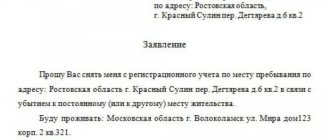Legal side
The owner of the apartment has the right to enter into a lease agreement, according to which another family will live in the premises.
The contract can be terminated unilaterally if the tenant does not comply with the terms of the contract. However, in accordance with current Russian legislation, it is impossible to evict citizens during the winter season. In this case, there are some concessions.
To provide for the possibility of unilateral termination of the contract, it is necessary to carefully draft the lease agreement. It reflects the possibility of severing the relationship in accordance with violation of conditions or other issues.
There are two agreements that give the right to live in the apartment.
The owner’s further actions depend on their types:
- social rental agreement. In this case, the tenant is the state and municipalities. It is impossible to evict under such an agreement in winter. The contract is concluded for a long term, in some cases indefinitely. The tenant has the right to privatize the property and become the full owner of the apartment;
- A lease agreement implies the transfer of property for private use under certain conditions. Most often, the landlord undertakes to provide an apartment, and the tenant - to pay rent and the amount of utility bills. Such an agreement is more common when an individual acts as a lessor.
The social tenancy agreement is regulated by the housing legislation of the Russian Federation. On the basis of the Housing Code of the Russian Federation, eviction can be carried out if the tenant does not fulfill his obligations under the contract. However, this is impossible to do in the winter season.
A lease agreement with a private person is governed by the Civil Code of the Russian Federation. All its points must be complied with.
Important! Eviction occurs in accordance with the clauses of the agreement:
- failure to fulfill obligations stipulated in the contract;
- termination of relations by agreement of the parties;
- termination of the relationship at the initiative of the tenant.
It is possible to evict tenants in winter due to clauses not provided for in the contract only by a court decision.
Is it possible to evict tenants in winter with or without an agreement?
The option, although associated with some financial and other expenses, is extremely reliable. Many experts insist on drawing up a lease agreement in order to protect themselves in the most seemingly hopeless situations.
For example, a long delay in rent payment or damage to property.
The owner sends an official notice of violation of the concluded contract. The text can indicate the time it will take to correct and the penalties provided for in case of refusal. For example, pay the debt by the end of the month.
If the tenants ignore the notice, the owner has the right to go to court. The plaintiff takes part in the hearings, presents evidence, and attracts witnesses. If the claim is well drafted, the court's decision will be positive. Let's take a look at the list of documents that may be required for legal proceedings:
- Statement of intent to evict tenants.
- Passport.
- Housing rental agreement certified by a notary.
- Documents proving ownership of housing.
- Written notification of a violation of the contract and a request to rectify the situation.
- Any evidence proving a breach of contract.
Let's look at the last point in more detail. The court decision depends on the quantity and quality of the evidence presented. What evidence can the owner provide?
- sound and video files that confirm violation of public order, damage to property, etc.;
- certificates and receipts of actual rent arrears;
- police report if there was a violation of public order;
- paper evidence of transfers of funds or requests for deferred payment;
- conclusions of housing and communal services and other authorities on the condition of the apartment before and after rent.
Unfortunately, you should not count on a quick solution to the issue. The trial can take several months (on average 2-3). Particularly complex cases are considered for up to a year.
Ultimately, you should be careful when choosing your tenants. A few simple tips will help with this:
- To be on the safe side, always sign up for a rental agreement.
- Decide on clear deadlines and payment options.
- Ask tenants to pay for utilities (you can include them in the rent).
- Visit the apartment periodically to check the safety of the property and the trustworthiness of the tenants.
- Ask about the place of work/study, the number of tenants, their family or other connections, etc. This will allow us to draw a conclusion about the potential solvency of the tenants.
- Keep any checks, receipts, or money transfer receipts from tenants.
In Art. 90 of the Housing Code of the Russian Federation states that tenants can be evicted for debts in paying utility bills. At the same time, they are provided with other living quarters.
In addition, eviction is allowed for other reasons:
- violation of the rules of residence, according to the law
- illegal transfer of an apartment to a non-residential property
- amoral behavior
These violations must be documented.
In Art. 85 of the Housing Code of the Russian Federation spells out the reasons why eviction with further provision of another living space is allowed:
- major renovation
- change in apartment area due to reconstruction
- transfer of the house to religious organizations
- emergency condition in which demolition of the building is necessary
- transfer of a house to non-residential stock
According to the law, the owner cannot be evicted for arrears in paying utility bills.
But Art. 32 of the Housing Code of the Russian Federation says that an apartment can be purchased by the state for state needs.
Important! If the debt for paying for the apartment is too large, then penalties are imposed on the owner.
Eviction is carried out in accordance with Art. 90 of the Housing Code of the Russian Federation and is permissible in the following cases:
- termination or termination of the tenancy agreement
- utility debt
- refusal to evict after termination of lease
- damage to the premises
Art. 103 of the Housing Code of the Russian Federation allows eviction if the tenant does not pay utilities.
If the rules of residence are violated, eviction is carried out through the court.
The parties are obliged to inform each other of their intention to terminate early. The lessor must provide evidence of non-compliance with the contract or violations. In cases where the contract specifies a period within which both parties must notify each other about the decision to terminate early, it is mandatory to comply.
The tenant must notify the tenant of the termination of the contract no later than 3 months before the planned eviction.
The contract can be terminated only in cases provided for in the contract or prescribed by law. In the absence of established conditions, eviction is carried out through the court.
The tenant must notify the tenants that they have corrected the violations or evict them in an appropriate manner. Proof of compliance with the landlord's obligations is the signature of the tenants and the date of delivery on the notice.
Important! The countdown of the period begins at 00 hours following the date of delivery of the notice to the tenants of the notice.
Before taking action to evict tenants in accordance with the lease agreement, the landlord is obliged to notify the tenant of his intention to terminate the agreement unilaterally. If there are good reasons, then it is worth reminding the employer about them.
For example, if a tenant constantly violated the peace and quiet, the rules of residence, then testimony of witnesses or court decisions, protocols on the commission of administrative offenses are provided.
The landlord notifies the tenant of his intention to terminate the lease three months before the action is taken.
Eviction takes place in accordance with the clauses of the current lease agreement, as well as the Civil Code of the Russian Federation. If the tenant does not want to leave the apartment, it is worth going to court. In accordance with the court order, the tenant is forcibly evicted.
If the tenant wants to evict the tenant due to a violation of the terms of the contract, it is necessary to demand that he fulfill his obligations. A receipt is submitted to the court, where the tenant undertakes to eliminate the defects within a certain period of time.
We suggest you read: Is it possible to register a child for school not according to registration?
Concluding an oral lease agreement does not provide any guarantees to either the tenant or the landlord, so you should not limit yourself to just agreements.
Of course, you can evict without a lease agreement. After all, the tenant has no rights to live in the premises. However, there are cases when residents do not want to leave their apartments.
In this case, going to court is expensive. After the process, the judge will transfer the data to the tax authorities, the owner will have to pay the amount of income tax for the entire period of receiving income from the tenant.
Attention! Often, residents intimidate owners by contacting the tax service. Don't be afraid. Declare yourself that you have been renting out an apartment for some time, but have not entered into an agreement. Then submit a tax return in Form 3-NDFL and pay the tax. Now you can go to court. The tenant's arguments will not be taken into account.
In addition, you can contact the local police officer. If he discovers that the tenants do not have any documents to live in the premises, the tenants will be required to leave the apartment immediately.
If there is a lease agreement, it becomes easier to evict the tenants. Termination of the contract occurs in accordance with the points specified in it. Before moving out, you should give time to find a new home.
All actions towards the resident must be clearly regulated and preserved. For example, an eviction notice is served against the signature of the tenants. Conversations should be recorded on a voice recorder.
You can take a receipt from the employer, who undertakes to fulfill the requirements within a certain period.
If the tenant does not want to leave the apartment, they should go to court. Having a court order in hand, the owner has the right to resort to the help of bailiffs who will forcibly evict the tenants from the premises.
If you decide to go to court to evict your tenants, you should notify them in writing. In the future, the document will serve as evidence in the case.

The statement of claim is drawn up according to the model approved by the territorial judicial division, so it is worth looking at the official website of the court or contacting the office in person.
Each case is individual. The court makes a decision based on the evidence presented. Often, owners achieve compliance with requirements.
If the court makes a decision in favor of the tenant, it can be appealed to a higher court within ten days from the date of proclamation of the decision.
If the tenant does not pay attention to the court order and does not want to leave the apartment, eviction occurs with the involvement of bailiffs forcibly.
Author of the article:
Anna Maksimenko
Do they have the right to evict in winter? According to the Housing Code of the Russian Federation, the landlord has every right to terminate the rental agreement early in any season of the year, including in winter, but for this it is necessary to have good reasons (more about the possible reasons for eviction, as well as from which living space they can be evicted, and from which - no, read in this article).
By law, an apartment owner can go to court for the possibility of early termination of a rental agreement if tenants violate the terms of the agreement or the established rules of living in apartment buildings.
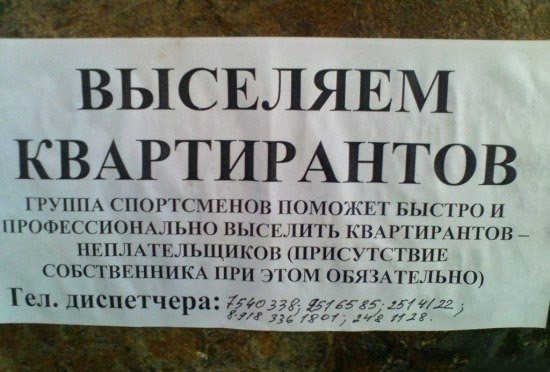
If the landlord proves violations by the tenants, the court has the right to make a decision on the early eviction of the tenants.
Can they evict if there is no contract? The landlord can also achieve eviction by personal agreement if the tenants are ready to vacate the rental property without a trial.
It is worth noting that if the tenants are pensioners, orphans, disabled people or relatives of law enforcement officers, dead or missing, then before eviction the landlord must offer another rental option for the tenants.
eviction of a pensioner from an apartment in winter
Hello, Alexander! In order to answer your question in more detail, you need to know who is the owner of the apartment you indicated? Is it privatized or not? In addition, from your question it is not clear for what exact reason your cohabitant evicted you, did she file a lawsuit to evict you or not? Usually the reason for eviction is: large rent arrears; systematic violation of the rights of neighbors; use of housing for other purposes; mismanagement of housing, damage to it, destruction; non-participation in the maintenance of the apartment, non-payment of utility bills; antisocial lifestyle, drunkenness and other similar behavior.
In your case, you write that your cohabitant evicted you, so we can conclude that you are not in a registered marriage with her. If your cohabitant is the owner of this apartment, then, unfortunately, you have virtually no legal rights to it. Since the owner of the apartment has an exclusive right - he can provide his housing for use to anyone (clause 2 of article 30 of the Housing Code). And therefore he does not need grounds for eviction. The owner can indeed legally evict without reason, but only if the right to use the residential premises has ceased (Clause 1, Article 35 of the Housing Code). And it terminates if the evicted residents: do not have a valid tenancy agreement, lease, or free use of the apartment. If there is such an agreement (including an oral agreement), it must either be terminated or wait until its expiration; are not members of the owner's family. If this is a family member (spouse, children, parents), they use the apartment on an equal basis with its owner (Clause 2 of Article 31 of the Housing Code), and therefore in order to evict them, it is necessary to end the family relationship. For example, divorce or deprive the tenant of parental rights (if the owner is a child); they do not have a share in the property rights. If a tenant owns even a tiny ⅛ part of the apartment, he cannot be kicked out. In this case, the basis for eviction can only be loss of property rights. For example, if he sells his share.
To confirm your legal stay in the apartment you indicated, you must have one of the following documents:
- order;
- contract of sale;
- privatization agreement;
- lease contract;
- deed of gift;
- certificate of inheritance
- other supporting documents.
Thus, one of the listed documents must confirm your legal right to live in the specified apartment. If you do not have any of these documents, then you do not have the legal right to reside.
However, the following cannot be evicted from the apartment: family members (children, parents, spouses) persons who voluntarily refused to privatize the apartment in which they live, despite the fact that they were registered in it - they have the so-called “eternal registration” and can live in such an apartment for life, they cannot be evicted (Article 19 of the Federal Law No. 189 of December 29, 2004);
former family members who do not have their own housing and whose financial situation does not allow them to purchase or rent it - their right to residence can be temporarily retained (clause 4 of article 31 of the Housing Code); children without parental care - it is impossible to evict them without providing equivalent housing that is not inferior, and ideally superior in consumer characteristics to the premises from which eviction is planned.
If you belong to any of the listed categories, then you cannot be evicted by law. And you have the right to go to court with a claim for illegal eviction from the apartment.
There are also a number of reasons under which the owner can be evicted from an apartment: Redevelopment that was not coordinated with higher authorities, that is, unauthorized, which endangered the house and the lives of the residents.
Improper use of the apartment, leading to its destruction.
The use of square meters for other purposes than their intended purpose, thereby disturbing neighbors, creating difficulties and inconvenience for them. Systematic violations. Constant failure to pay utility bills (not the most compelling reason for deprivation of housing, if there is no other place to live, they will not be evicted for this).
If you are the owner of the apartment you indicated and there are no reasons to evict you from it, you must also file a claim with the court for illegal eviction. However, the fact of illegal eviction must be confirmed by you with documents (warrant, receipts for payment of utility bills, testimony of neighbors, etc.).
Causes
There can be many reasons for eviction: delay in payments, noisy behavior, damage to property, etc. Even justified complaints from neighbors will become grounds for terminating the relationship.
The law does not impose restrictions on the eviction of tenants at any time of the year. If a citizen is a home owner, then he has the right to dictate his own conditions. Although there are a number of nuances. Let's look at the main reasons that can lead to eviction:
- use of the apartment for purposes other than its intended purpose or for commercial purposes. For example, breeding domestic or exotic animals. Use it as a storage room, turn the apartment into a carpentry workshop, laboratory,
- late payment of rent or long delay {amp}amp;#8212, more than six months,
- construction and other work that leads to changes in the technical plan,
- actions that lead to damage to property or pose a threat to human life,
- re-renting and making a profit without the consent of the owner,
- expiration of the lease agreement.
Regardless of the reason, the owner must give tenants at least a week's notice. If you cannot do without the intervention of judicial authorities, you can send an official notice to your residential address.
Things are much simpler when a lease agreement is drawn up. An official document signed by the parties, certified by a notary, will become a valid reason for the eviction of unscrupulous citizens. Things are more complicated when the contract has not been formalized. In this case, it is impossible to do without involving the police.
When terminating the contract, the legality of the requirements must be observed. In this case, they rely on articles of the Civil Code of the Russian Federation.
In any case, the legal conditions for eviction of tenants are:
- the contract has expired;
- if the tenant uses the property other than for its intended purpose, for example, not for residence, but for commercial purposes;
- if the tenant fails to fulfill the terms of the agreement regarding payment of rent within six months;
- the tenant constantly violates the rules of residence (complaints are received from neighbors, the police are involved, citizens lead an antisocial lifestyle);
- the tenant neglects the property, for example, damages the walls, carries out redevelopment without consent, etc.;
- if the landlord wants to transfer ownership of the apartment, and the new owner does not want to renew the lease agreement.
In any case, the landlord is obliged to warn the tenant about the intention to terminate the contract one week before the action is taken. The tenant is given some time to move and vacate the premises.
If the tenant does not want to leave the apartment, eviction by court decision occurs forcibly.
Attention! Our qualified lawyers will assist you free of charge and around the clock on any issues. Find out more here.
- use of the apartment for purposes other than its intended purpose or for commercial purposes. For example, breeding domestic or exotic animals. Use as a storage room, turn the apartment into a carpentry workshop, laboratory;
- late payment of rent or long delay - more than six months;
- construction and other work that leads to changes in the technical plan;
- actions that lead to damage to property or pose a threat to human life;
- re-renting and making a profit without the consent of the owner;
- expiration of the lease agreement.
Legitimate reasons
When wondering whether it is possible to evict tenants, it is necessary to justify the reasons why they should leave the premises provided to them for temporary use. Such reasons may include the following:
- expiration of the tenancy agreement;
- a situation in which the tenant uses the premises entrusted to him for other purposes (for example, to make a profit);
- if tenants have not paid money for the use of utilities for 6 months;
- when tenants violated the rules of public order on an ongoing basis, which caused serious discontent on the part of neighbors;
- if the tenants mistreat the residential premises, or even cause some damage to it, leading to its partial destruction;
- if a situation arises in which the owner of the premises changes, and the new owner is against the tenants’ residence.
In fact, the owner of the residential premises has the right to terminate the tenancy agreement at any time, and if there are compelling reasons, even without warning the tenants.
Is it possible to evict during winter?
According to the Civil Code of the Russian Federation, the landlord has the right to demand that the tenant vacate the premises at any time of the year, including in winter. In winter, tenants cannot be evicted if the contract is regulated by the Housing Code of the Russian Federation (under a social tenancy contract).
According to the lease agreement, it is enough to justify the legal reason for the eviction of the tenant. They are contained in the terms of the contract. A complete list can be found in the Civil Code of the Russian Federation.
However, tenants often do not want to vacate the premises in the winter season, explaining their refusal by the fact that there is nowhere to move at the moment. In this case, you must go to court. The judiciary always stands on the side of the law. If there are legitimate reasons for terminating the contract, the court will decide in favor of the lessor.
Important! The following serve as justification for the requirements to vacate the premises:
- the results of the examination of the emergency condition of the structure;
- testimony about the antisocial lifestyle of the employer;
- a lease agreement that describes the conditions for unilateral termination of the relationship;
- a receipt from the tenant, which contains an obligation to leave the apartment within a certain period of time.
We suggest you familiarize yourself with: Power of attorney procedure for registration
It is worth providing the court with all the documents that confirm the legality of the claims.
If there are grounds for eviction of tenants, the landlord can demand eviction, regardless of the time of year. Eviction in winter is possible according to the housing code.
The reasons for eviction are not particularly important. The grounds may be specified in the agreement signed by the parties. Or they are contained in the Civil Code.
Often, to evict tenants in winter, it is necessary to go to court. There, evidence of tenant violations of the terms of the contract is considered, and only then a decision is made on early eviction.
The following can serve as a basis:
- decision of the expert commission on the emergency condition of the house
- witness statements
- agreement
- receipts
Step 1 – Initiate legal proceedings. To do this, it is necessary to collect evidence that the tenant was repeatedly notified of eviction, the presence of an outstanding debt and continued to ignore payment and other demands of the tenant.

Step 2 – Submit complaints from neighbors against the tenant to the local police officer. If a tenant is violating the peace, this can be strong evidence in court.
Step 3 – Attract witnesses and record all violations of temporary tenants. For example, you can prove insolvency using a register with the dates and amounts of transfers, and with violators of peace and public order, you can record all complaints from neighbors and appeals to the local police officer.
Step 4 – File an eviction claim with the court. Describe in detail the existing reasons for eviction, the cost of possible damage caused and, if necessary, provide monetary compensation. Registers, statements, certificates and any other evidence play an important role as supporting documentation and are attached to the statement of claim.
It is always better for the landlord and the tenant to agree and make concessions to each other, for example, to grant a deferment on eviction during the unfavorable winter period.
If you have not found the answer to your question, then you can get an answer to your question by calling the numbers ⇓
Free legal advice
Moscow, Moscow region call:
7
One-click call
St. Petersburg, Leningrad region call: 7 (812) 467-36-24
One-click call
From other regions of the Russian Federation, call: 7 (800) 333-49-12
One-click call
- The tenant must familiarize himself with the terms and conditions of the rental in advance to avoid possible problems in the future. When signing the document, the tenant has legal protection, on the basis of which eviction is possible only in case of objective reasons established by contractual relations and the Housing Code of the Russian Federation. In other cases, eviction is illegal.
- If the owner wishes to terminate the document without valid reasons, and the tenant does not give the appropriate consent, then the owner can formalize the termination in court. But in this case, the possibility of termination is unlikely without the consent of the tenant and the absence of objective reasons. In any case, the owner of the apartment must notify the tenant about this in advance (you can learn about the differences between a warning, a notice and a requirement to evict from an apartment, and also see sample documents in this article).
- Before renting a home, a future tenant can check the property for inclusion in the renovation list. If the building belongs to the renovation program, then the landlord has the right to early termination, since this is an objective reason for eviction.
- The tenant must ensure that he signs the document with the property owners or their authorized representative. To do this, you need to familiarize yourself with identification documents, documents on property rights, as well as a notarized power of attorney, which makes it possible to represent the interests of home owners.
Eviction of tenants in winter is no different from standard
eviction procedures
and occurs legally. In order to terminate the lease agreement early, the apartment owner must have objective reasons for such a decision.
It is possible to terminate the document by mutual agreement or through a judicial authority. If there is no contractual relationship, the landlord has the right to evict the tenants at any time.
If you find an error, please highlight a piece of text and press Ctrl Enter.
How to evict tenants in the winter with a contract?
Law-abiding landlords enter into a social rental agreement, and some even have it certified by a notary. This document serves as a guarantee that the parties are protected by law and can defend their interests in court.
We recommend reading: How to evict a registered person from an apartment if he does not agree?
Step-by-step instruction
- Stage No. 1 Establish the reason for the eviction of tenants. For example, outstanding rent arrears.
- Stage No. 2 Notify the apartment tenants of the intention to go to court if the violations are not corrected. The notice will be in writing, specifying the reason, duration and possible penalties. Let’s assume: they haven’t paid rent for an apartment for more than 6 months - pay off the debt within 1 month - sanction: eviction from the apartment with debt collection + legal costs through the court.
- Stage No. 3 If there is no response, you should go to court with a statement of claim for the forced eviction of the tenants.
- Stage No. 4 Participation in preliminary and main hearings. The plaintiff will have to prove his case, provide evidence, and also attract witnesses (if necessary). As a result of the final decision, the court will terminate the tenancy agreement.
- Stage No. 5 Obtain a copy of the writ of execution from the court office. Based on the court decision, you can safely evict the tenants from the apartment. If they do not want to vacate the premises, involve the district police officer, bailiffs and employees of the Ministry of Emergency Situations.
List of documents
When resorting to judicial eviction of tenants during the heating season, you should take care to prepare the following package of documents:
- statement of claim for eviction of the tenant (to the defendant separately);
- Russian passport + copy;
- a written rental agreement for residential premises;
- title documents for housing (sale and purchase agreement, inheritance, deed of gift, exchange agreement);
- notification or requirement to vacate the living space voluntarily;
- extract from the Unified State Register or certificate of ownership;
- extract from the house register;
- power of attorney + copy of the representative’s passport (if necessary).
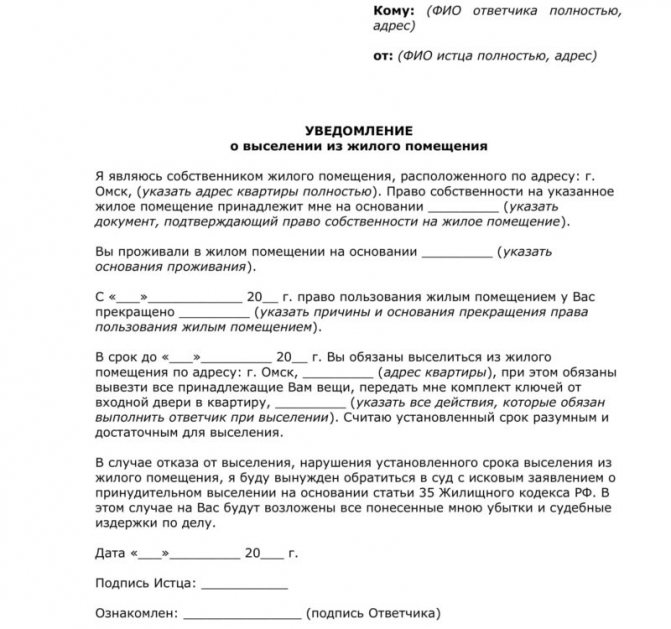
The standard list of documents will be useful for applying to the court office. Everything related to evidence rests on the shoulders of the owner or his representatives. It is they who have to prove that the tenants are violating the terms of the contract, as a result of which the agreement should be terminated at the initiative of the plaintiff.
Evidence base
An extensive, strong and diverse evidence base increases the chances of success in the upcoming case. Before making a decision, the court will examine the rental agreement, the actions of the parties, their evidence, valid reasons, complaints and other arguments.
We are interested in the evidence base in favor of eviction of tenants in winter.
The plaintiff may prepare and submit to the court the following evidence:
- audio and video materials (originals and copies);
- personal account statements - if tenants have debt;
- written testimony - the full name, address and contact details of the witnesses are indicated;
- conclusions of the BTI, housing department on the condition of the living space;
- protocols of the district police officer, law enforcement agencies - if evicted for violating public peace;
- receipts - if money was passed from hand to hand;
- written notices requesting deferment of payments;
- photo of the apartment BEFORE and AFTER the tenants move in (on CD or DVD).
Superficial or insufficient evidence may lead to the denial of claims. This is why it is recommended to involve a lawyer.
Statement of claim (sample)
A properly drafted statement of claim is considered a prerequisite for going to court.
How to compose it and what to include in the content:
- name of the court (district and/or city court);
- Full name of the plaintiff, place of residence, contact details (telephone, email);
- Full name of the defendant, detailed information;
- the main essence of the claim against the defendant;
- why the plaintiff wants to terminate the rental agreement;
- whether he applied the pre-trial procedure (notifications, notifications, persuasion);
- a list of violations committed by the tenant or members of his family (for example, failure to pay rent for more than six months);
- what the claims are based on - specific legal acts, articles;
- claim to court;
- what documents are attached (appendices + evidence);
- date and personal signature (transcript).
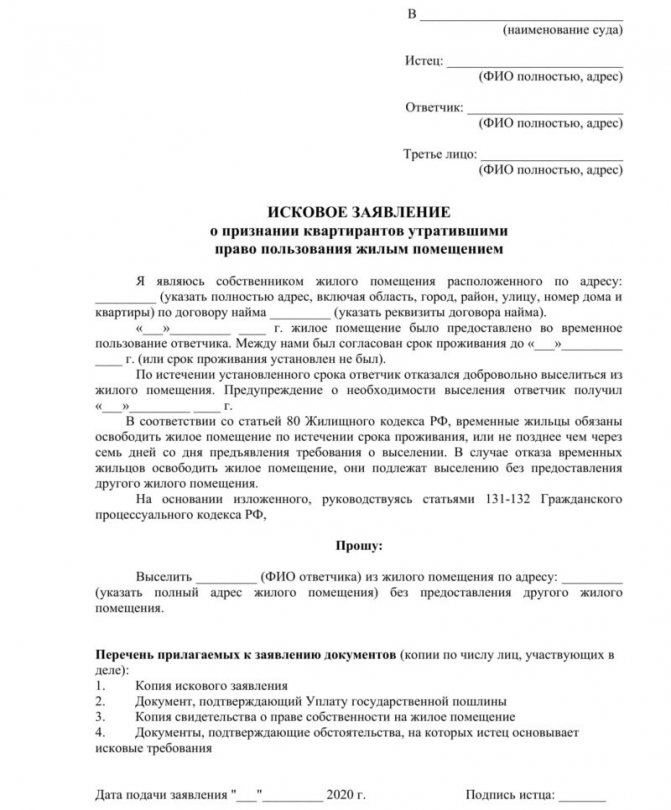
The content of the statement of claim must comply with the provisions of Art. 131 of the Code of Civil Procedure of the Russian Federation, as well as meet the standards for document preparation.
Deadlines
How long does it take to evict tenants through court? You definitely shouldn’t count on a quick process – the courts study the information provided for at least a month. Typically, such cases last from 2 to 6 months , and in some cases up to a year.
Price
Civil procedure legislation exempts the plaintiff from court costs ( state duty for filing a claim is 300 rubles ) if the final decision is entirely in his favor. Financial costs are shifted to the defendant (Article 98 of the Code of Civil Procedure of the Russian Federation - general expenses, Article 100 of the Code of Civil Procedure of the Russian Federation - costs of the plaintiff for a representative, lawyer or attorney). However, when filing a claim, a state fee must be paid.
Case study: Landlord V.D. Kuleshov found tenants for a 2-room apartment in the center of Moscow. The parties drew up a rental agreement for residential premises, registered it with a notary and discussed the essential terms. Kuleshov filed a declaration with the Federal Tax Service in order to pay a 13% tax on income from renting out an apartment. The tenants paid their rent on time, but instead of housing they used the apartment as a workshop for repairing household appliances. They didn’t pay taxes, they worked according to “gray” schemes – and the most unpleasant thing was that they significantly “poisoned” the lives of their neighbors. Noise from the operation of machines, debris on the landing, high load on electrical panels and wiring. The neighbors complained, but it brought no results.
Tired of the constant noise, the neighbors called the local police officer, who drew up a report of an administrative violation against the residents. Following this, the neighbors filed a class action lawsuit to force the eviction of unwanted tenants. The defendant in the lawsuit was the owner of the apartment, Kuleshov. The arguments played their role, the court satisfied the claims, and the owner had to evict the noisy “entrepreneur” tenants.
You may be interested in how to kick tenants out of non-residential premises if they use it for other purposes and violate housing rules.
How to notify tenants of eviction
If the owner of the property has decided to evict the tenants, it is necessary to notify him of this three months from the expected date of eviction. This can be done in the following ways:
- hand over the landlord's request for eviction in person and against signature;
- send by mail a written notice of eviction indicating the reason for eviction, the deadline by which the tenant must leave the premises, and the requirement to pay off all outstanding debt. The delivery notice will contain the tenant's signature, which will later serve as evidence in court that the landlord notified the tenant of the eviction;
- in case of refusal to sign the demand for eviction, it is necessary to attract two neighbor-witnesses and read out this demand orally.
Municipal housing
In accordance with the Housing Code of the Russian Federation, it is impossible to evict a tenant from an apartment during the winter period.
However, Article 85 of the Housing Code of the Russian Federation contains conditions under which eviction is carried out at any time of the year:
- if it is planned to carry out major repairs in the house (in this case, the right of residence remains with the tenant);
- the apartment is planned to be reconstructed, for example, to increase or decrease the area;
- if the house is transferred to the ownership of a religious organization;
- if the house has fallen into disrepair, there is a conclusion from the expert commission about the emergency state of the building;
- if the building is transferred from residential to non-residential.
Otherwise, eviction of the tenant in winter is impossible, even if he does not fulfill the terms of the contract.
Often, organizations provide their employees with office housing.
Please note! Eviction from such an apartment can occur for several reasons:
- if the tenant damaged someone else's property;
- if the contract has expired, the company does not want to renew it;
- if the employee has accumulated a large debt for utilities;
- termination of an employment contract under which premises were provided for private use.
According to the paragraphs of the Civil Code, the eviction of tenants occurs by decision of the judicial authority.
If the tenants have children
In order to evict tenants, you will need to go to court. Femida employees will consider facts of violation of the terms of the lease agreement by tenants. At the end of the trial, the court may issue a ruling on the early eviction of citizens or extend this period for certain categories of citizens.
- expiration of the rental period for residential space agreed upon by the parties;
- insolvency of the tenant, which implies malicious evasion of payment of rent to the landlord. Sufficient grounds will be the tenant's failure to pay rent for two months in a row;
- decision of a special commission on the emergency condition of rental housing;
- misuse of rented housing for offices, warehouses, shops, etc.;
- sublease, i.e. rental of housing to third parties;
- causing material damage, violation of housing conditions, redevelopment of premises;
- violation of silence by the tenant and persons living with him, complaints from neighbors;
- antisocial behavior of the tenant;
- seizure of housing for municipal needs.
The option of concluding an oral rental agreement is very common, since the landlord does not incur additional costs for paying taxes, certification and state registration of the rental agreement. Before refusing to enter into a lease agreement, both parties need to consider all possible risks that may arise in the future. In this case, there are two scenarios for the development of events, shown in the table below.
| Settlement agreement | The landlord notified the tenants in advance about the need to vacate the living space and the tenants accepted this fact |
| Through the local police officer | The tenants refuse to vacate the occupied living space, while the landlord calls the local police officer with a statement of illegal occupation of housing and invasion of housing for forced eviction from the apartment |
We invite you to familiarize yourself with: Daily outfit in the army, composition and responsibilities of the daily outfit
The rental agreement can clearly state the terms and conditions for eviction of tenants in winter or at other times of the year. If the tenants refuse to comply with the established terms of the contract, the landlord must go to court. In this case, the following conditions must be met:
- the housing lease agreement has passed state registration;
- the landlord paid taxes to the budget on time.
Only then can the transaction be considered legal and legitimate. It is possible to resolve the issue of vacating a home from tenants in the presence of a lease agreement only through the courts, even from housing that is personally owned. When a lease is cancelled, tenants are required to vacate the lease in accordance with a court order.
If the tenant has previously privatized the apartment, then no one has the right to evict him. If there is a debt for utility services, penalties are imposed on the tenant, as well as activities aimed at repaying the debt, for example, turning off electricity, heat, water, etc.
There are reasons why privatized housing is transferred back to state ownership. This is the death of the owner and the absence of heirs. Moreover, all residents of the premises can be evicted at any time of the year.
If there is no concluded lease agreement between the tenant and the tenant, then tenants can be evicted at any time of the year, regardless of whether they have children.
If there is a lease agreement, eviction occurs according to the terms of the agreement. It does not reflect the presence of children, so their presence does not in any way affect the landlord’s decision to terminate the relationship.
If the landlord applies to the court with a request to force a family with children to leave the premises, the court pays attention to the presence of minors. It is quite possible that during the winter the family will not be evicted, but will be required to vacate the apartment on the first day of warming.
An alternative option is to provide a deadline for eviction. For example, within fourteen days from the date of the decision, tenants are required to hand over the keys to the apartment to the owner.
Some nuances
The question of whether it is possible to evict tenants during the heating season assumes such an outcome. If, for example, this residential premises is occupied by tenants on the basis of a social rental agreement, then eviction must occur under the following conditions:
- on the basis of the provision of another equivalent premises, which can either be equipped or not;
- without providing other accommodation.
An eviction of this kind must necessarily be carried out on the basis of an appropriate court order in a situation where the tenants refuse to vacate the apartment voluntarily. Tenants with children can also be evicted in the same way. However, the situation with children is quite sensitive, so if such a circumstance exists, a decision will be made to provide alternative housing.
Without the provision of a new place to live, only certain categories of citizens do not have the right to evict. These categories include family members of a military personnel or employee, as well as pensioners and disabled people of groups 1 and 2. This also includes children who are left to their own devices, without the care of relatives or another adult.
Dormitory
You can evict a tenant from a dorm room on the same grounds as from a service apartment.

However, there is a category of persons who cannot be deprived of housing in any case, at any time of the year:
- disabled people of the first and second groups;
- families with a disabled child;
- orphans disabled since childhood;
- pensioners recognized as such in accordance with the regulations of the Russian Federation;
- parents, wife, children of a serviceman who died in the line of duty.
If the tenants have children
The owner cannot kick out the tenants any day he pleases. This would be a direct violation of constitutional rights. In any case, eviction, whether voluntary or through the courts, will take some time.
The situation is special when it comes to a social rental agreement with local municipal authorities.
As a rule, housing is provided to low-income citizens and no one has the right to kick out tenants in the winter. Citizens simply do not have the physical ability to find suitable housing in a short time.
Often a family with minor children lives in the apartment. When it comes to eviction, the law is completely on the side of the landlord. It is adults who are responsible for the rented living space and all consequences for dishonest fulfillment of the obligation fall on their shoulders.
Eviction of tenants during the heating season
Often the pressing question for residential property owners is whether it is possible to evict tenants in winter. The legislation of our country provides for this, that is, temporary residents can be evicted in the winter in exactly the same way as in any other period.
In this situation, the owner of the apartment must prove in court that he has specific grounds that the tenants should be evicted right now. The same applies to the question of whether it is possible to evict tenants with children in the winter, then this is also provided for, but it is imperative to provide some time for temporary residents to find other housing.
In a situation where the owner of a residential property wants to evict tenants without compelling reasons, this is only possible if the agreement between him and the tenant was oral. In fact, in this case, the owner can do whatever he pleases, since the transfer of the temporary right to use the residential premises has not occurred. Here, contacting the police can bring certain results to the owner. He can simply write a statement for illegal entry into private property, then the tenants will be promptly escorted out of the premises.

If the tenant refuses to accept the eviction notice
If, when concluding a lease agreement, the owner registered a tenant in the apartment, then evicting him becomes problematic. Registration gives full right to reside and use the property.
Before terminating the lease agreement, make sure that the tenant of the residential premises is deregistered. To do this, you should contact the territorial division of the Federal Migration Service.
Remember! You can be discharged from an apartment for several legal reasons:
- if the court made a decision to evict citizens from the apartment;
- if residents independently wish to deregister.
Thus, in order to evict a person registered in it from an apartment, it is necessary to go to court.
However, there are other grounds on which a tenant can be discharged from the apartment unilaterally:
- if the registered person died (for this you must present a death certificate);
- if the former tenant is serving a sentence in a colony (the owner presents a copy of the court order ordering the citizen’s detention);
- if there is a court ruling declaring a citizen missing;
- if the court decided that the citizen registered in the apartment on illegal grounds, or there was a fictitious registration.
Owners often don’t even know about fictitious registration. This is done by corrupt employees of the Federal Migration Service. Activities are prosecuted by law.
If you want to evict tenants from your own apartment, you must send notice of the action. However, some residents are confident that if they do not accept the notification, then the fact of notification cannot be proven.
Tenants can be notified of the intention to evict further by registered mail. The notice serves as proof of the tenants' acceptance of the notice.
If in a lawsuit the tenant claims that you did not notify him of your intention to terminate the contract, you present the mailing notice.
Exceptions to the rules
Article 103 of the Housing Code of the Russian Federation identifies some restrictions when it is impossible to evict a citizen from housing without providing another place of residence.
Important! These include:
- wives, parents, children of military personnel who died or went missing in the performance of their immediate duties;
- pensioners who are recognized as such in accordance with Russian legislation;
- disabled people of the first and second groups;
- orphans;
- close relatives of the deceased person who received an apartment in connection with the performance of work duties.
The rules apply to the tenant of the premises, not the tenant. Renting residential premises is the use of state and municipal property. Rent is the use of private property according to the terms of the contract. The landlord has the right to evict a tenant at any time of the year, regardless of any exceptions.
Eviction through court
If the tenant and the landlord cannot resolve the conflict on their own, it is worth going to court. Both the first and second parties have the right to submit an application. It is worth considering whose side the law is on.
To submit a statement of claim, it is worth collecting a package of documents.
It includes:
- lease agreement or a copy thereof;
- receipts, checks, receipts for payment of rent for premises;
- the results of an examination of the condition of the house (upon eviction in accordance with the emergency condition of the building);
- a copy of the eviction notice (postal receipt of certified mail);
- receipt of payment of state duty.
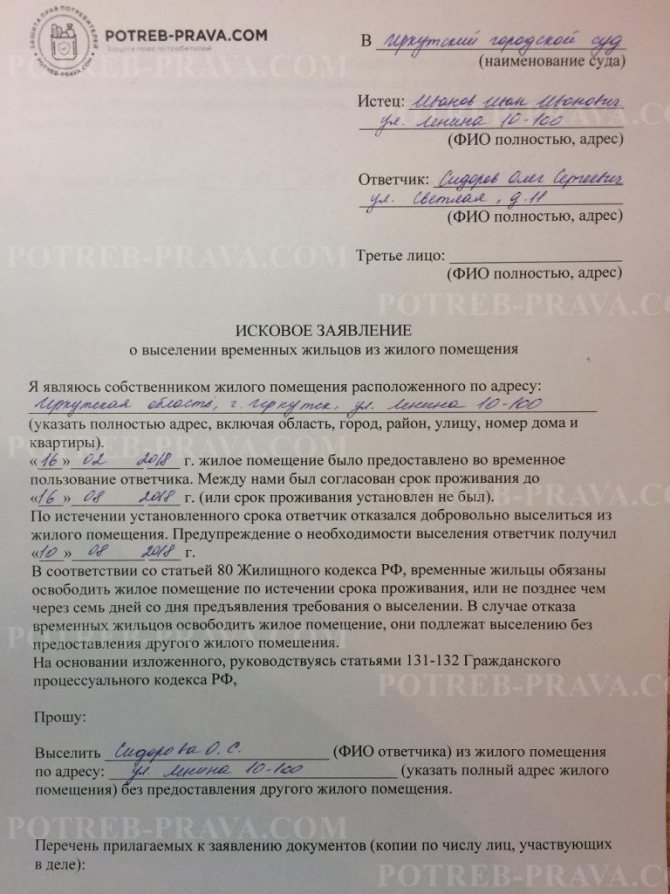
The court makes a decision based on the evidence presented by the plaintiff and the testimony of the defendant. The defendant has the right to file motions to consider other evidence.
After the court makes a decision, the parties receive a court order. It must be executed within thirty days, unless otherwise specified in the document.
Evidence base
Before writing a statement of claim, it is worth collecting evidence. It is on the basis of the documents provided that the court will make a decision.
Remember! The following will serve as evidence in the case:
- testimony of neighbors, housing and communal services employees, housing and communal services, management companies,
- extracts from the Criminal Code on the formation of debt for the specified period of time,
- photos, video files indicating a violation of the terms of the contract, as well as clauses of the Civil Code of the Russian Federation,
- Dictaphone recordings of conversations between the owner and the tenant.
Video and audio recordings must be made with the consent of the resident. Otherwise, the evidence is considered illegally obtained and is not accepted for consideration. An exception is video filming at the entrance if CCTV cameras are installed.
